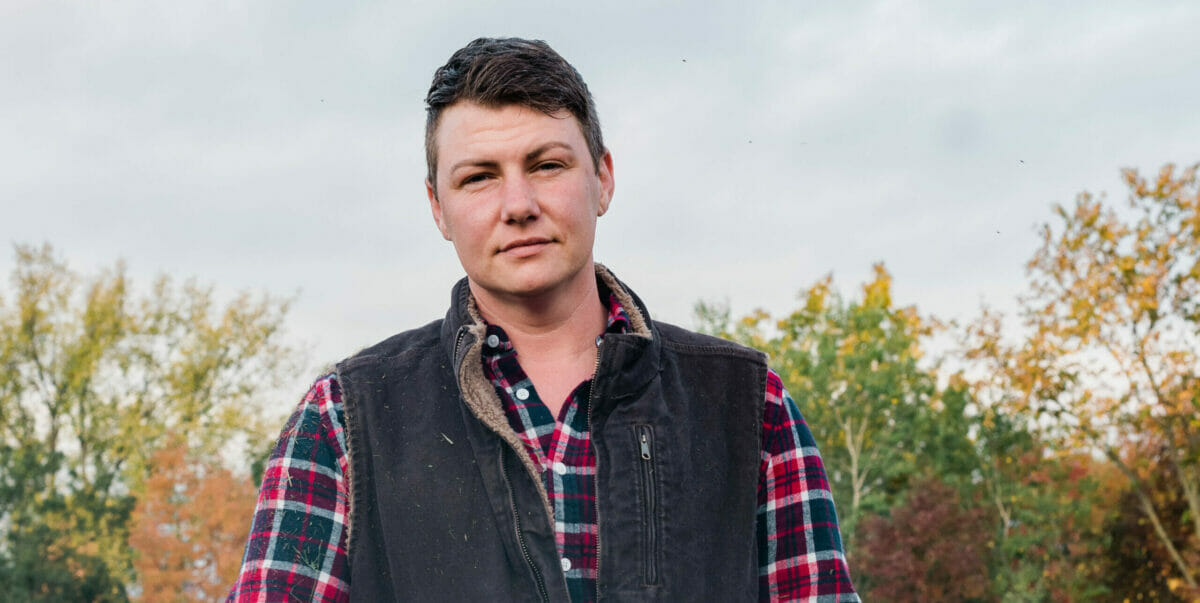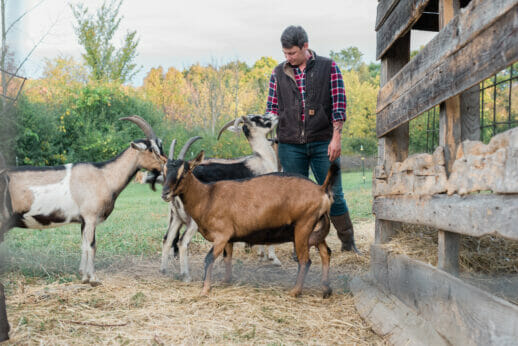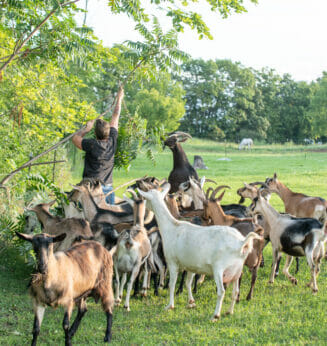After Lee Hennessy nearly lost his farm, an unexpected community came together to help. Now, he wants to show the same support for others.

Before he became a farmer, Lee Hennessy was searching for a career that would make him happy. He bounced around marketing and entertainment jobs, but the fulfillment he was seeking never came. Nothing felt like the right fit.
Everything changed when he visited a goat creamery in the Provence region of France while working for a wine company. Seeing a first-generation farmer successfully making and selling cheese opened Hennessy’s eyes to a life he’d never seriously considered before: that of a dairy farmer.
He started working on other farms, learning everything he could. In 2017, Hennessy, who identifies as a trans man, started Moxie Ridge Farm, a 46-acre farm in Washington County, NY.
Over the last century, the American farming industry has been dominated by straight, white, cisgender men. According to the 2017 Agriculture Census, 64 percent of American farmers are male and 95 percent of American farmers are white. That may be changing as a new generation of farmers enters the field. The United States Department of Agriculture doesn’t track statistics on sexuality or gender identity, but a survey conducted by the National Young Farmers Coalition found that 63.5 percent of farmers under the age of 40 identify as female, nonbinary or a gender other than cisgender male.
These diverse young and emerging farmers support one another with the hopes of shifting the idea of who is “supposed” to be farming. Hennessy, who has felt supported by his community now more than ever, hopes to be a visible role model for other young trans people who want to farm.
“It’s something I wish I had growing up and trying to figure out some of these larger life choices,” says Hennessy.
Throughout most of his life, Hennessy presented as a woman. It wasn’t until he started Moxie Ridge Farm that he got the space and time he needed to really explore his identity both as a farmer and as a person. When he came out as trans, Hennessy was welcomed with open arms by the farming community in Washington County, many of whom identify as queer themselves.
“A lot of people expect me to have horror stories, transitioning in a small rural town. And that’s just something that I don’t have to offer,” says Hennessy.

Hennessy uses behavior-based management with his goats. Every goat has a name and each goat has a distinct personality. (Photo by Nancy Giard)
Over time, Moxie Ridge Farm grew from a one-man operation with seven goats to a successful goat creamery with a full-time cheesemaker, a small staff and a herd of 75 goats. Hennessy wanted to build a farm with local, small-scale values that prioritized the well-being of animals and quality of the food being produced. In just seven years, that’s exactly what he did.
In March 2022, however, disaster struck and one of the farm’s boilers broke down. Without the boiler, the farm couldn’t pass inspection and Hennessy had to dump all of the milk—a devastating loss for Moxie Ridge. He estimates that the farm lost almost half its income for the year.
Hennessy’s insurance company said it would cover the damages. But after working with the insurance company for almost a year, the insurer pulled out in Jan. 2023 due to a clerical error it made. Hennessy was devastated. Without the insurance coverage, he feared he’d have to close the farm.
“A big part of me was angry, because it’s so hard for farmers to make it anyway. And all of the reasons why it looked like we had to close, it was this freak thing?”

After a machinery breakdown, Moxie Ridge had to sell part of its goat herd to cut costs. (Photo by Nancy Giard)
To cut costs, Hennessy took out loans, laid off staff and sold part of the goat herd. He spent every day grappling with how to save the farm he had worked so hard to build. Although the machine breakdown was out of his control, Hennessy says a part of him felt ashamed about the situation.
But after some encouragement from a close friend, Hennessy shared his story with the community and started a GoFundMe with the goal of raising $45,000. If being vulnerable meant saving the farm, Hennessy said it would be worth it.
Within a week, the campaign had raised more than $40,000. Friends, farmers and strangers from all over the country chipped in. Those who couldn’t give money offered what they could. A queer-owned farm in Granville, NY. offered to donate piglets. One woman painted watercolors of the farm’s goats.
Hennessy says he’s never felt more supported by the community. After months of worrying whether he could pay the electric bill, whether he’d have to sell more goats or whether the farm would survive at all, he could finally start dreaming of a future for Moxie Ridge Farm.

Oona Montalvo painted watercolors of Moxie Ridge Farm after seeing the farm’s GoFundMe. (Photo by Lee Hennessy)
Going forward, Hennessy hopes Moxie Ridge Farm can become a safe place for other trans and queer people who want to learn how to farm. Just as so many in the farming community have embraced him, he hopes to do the same for others who may not think they belong in farming.
“No matter who you are, if you’re Black, disabled, trans, whatever you’re part of that’s not the basic ‘cis, white-man farmer in America’—there are people who have gone before you,” says Hennessy. “We just haven’t heard about them.”
Yes there is significant support out there for young farmers of all types.Glad to hear of your success.
In the face of ignorance, bigotry and hatred, people like Lee Hennessy are an inspiration to all of us who have ever felt excluded or misunderstood. The bullies can die mad. 😘